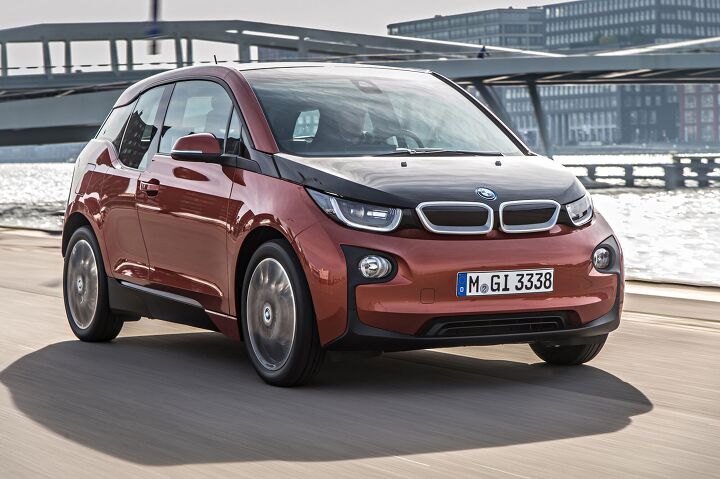
Last year, the owner of a 2015 BMW i3 REx was reportedly quoted over $71,000 to have a new battery pack installed. For reference, that particular model would have retailed somewhere around $50,000 brand new. While we’ve seen some staggering high prices being entertained for EVs in need of a new battery pack this has to be one of more egregious examples on record.
According to an invoice from a Seattle-area BMW service center shared on Reddit, the owner was quoted $64,588 for parts last August. After taxes, that amounted to $71,208 and that’s before anyone bothered to factor in labor. The invoice has since been shared by CarBuzz and is making the rounds as the latest reason to feel uneasy about EV ownership.
The post was followed by (mostly i3) drivers sharing similar accounts of how much they were asked to spend on similar battery jobs. Most cited repair bills around $11,000 with parts and labor included. However, there were a few individuals claiming to have been quoted upwards of $30,000 for having a fresh battery installed into their BMW.
From CarBuzz:
Some Reddit users believe the dealer is unwilling to carry out the repair. By presenting owners with ridiculous quotes, they will likely be put off and search for an alternative (or purchase a new car). “They can’t just say, ‘no, we don’t want to do it,’ so they make the price so ridiculous it pushes the customer into getting a new car,” wrote one user in the replies. Of course, there’s no proof that the dealer is doing this on purpose, so i3 owners (and those who drive older EVs, for that matter) may have to look to the aftermarket for solutions.
The battery pack in an i3 consists of eight cells. But even if one goes awry, it can still cost the owner big bucks. So, if you own an i3 or another older EV, it may be worth looking for an expert or specialist who can carry out these repairs for far less money. A single battery module costs between $3,000 and $3,500, so it’s possible that the repair can be carried out for nowhere near the obscene $70,000+ quote mentioned above. With repair bills like this, it’s no wonder people view EVs as throwaway items.
Some of this is rather insidious, mimicking the changes cell phone companies implemented over the last decade to make mobile devices less user serviceable. By ensuring customers cannot simply purchase a part cheaply online and install it at home (or via independent repair shops) with ease, businesses are setting themselves up for repeat interactions and likely additional revenue. In 2010, there was a nearly 100-percent chance you could change the battery in your phone yourself without much trouble. By 2020, that had become an unlikely prospect. Today, you are basically required to seek help from the company you bought the device from and they’re doing their best to withhold parts to make life harder on your local smartphone repair guy.
While things are a little different in the automotive sector, meaningful overlap remains. EV batteries are indeed quite expensive, with nearly half of the new vehicle’s total cost being attributable to the energy cells, and most independent shops aren’t set up to handle them. The cells also degrade over time, meaning you can’t stockpile a bunch of units like you might with certain engine components. This all adds to cost, with an industry survey conducted by JD Power stipulating that the typical price of a new battery for pure EVs and plug-in hybrids typically ranges between $4,000 to $20,000.
So then why are we seeing quotes in excess of $50,000 being reported?
As noted in the Reddit thread, sometimes shops don’t want to deal with the added hassle and overcharging customers is a good way to make their problem go away. Dealers are already fractured on whether or not to spend loads of money refurbishing their facilities to better handle EVs. But even those that have sometimes find that the sale of lower-volume electrics aren’t worth the added strain of catering to divergent powertrains. Working on them requires specialized tools, training protocols, and requires parts that definitely won’t be lying around in the back and probably can’t be shipped overnight by Federal Express.
Your author has spoken to plenty of dealer reps over the years and several have said EVs started to become a big headache for them by 2023. This later became public knowledge as sales data indicated that U.S. sales volumes had plateaued last summer. Whether the culprit was the hesitant consumers, an overeager regulatory landscape, a lackluster economy, or simply ineptitude on the part of the automotive industry, the end result has been the same for consumers.
Unless you’re driving the kind of vehicle that just needs a fresh DieHard tossed beneath the hood every few years, expect battery repair bills to be serious expenditures. But, if someone says you need to spend the same amount of money as the car originally retailed for, assume they either cannot or will not do the necessary work on your vehicle.
Assuming the price of raw materials eventually come down, the problem will presumably iron itself out as EVs become more commonplace. However, when exactly that will be is a hard to predict. Despite there being a lot of talk about electrification strategies within the industry, just about every legacy manufacturer that isn’t Tesla has repeatedly had to readjust their timeline. An “affordable” battery swap may still be $10,000 several years from now.
[Image: BMW]
Become a TTAC insider. Get the latest news, features, TTAC takes, and everything else that gets to the truth about cars first by subscribing to our newsletter.

